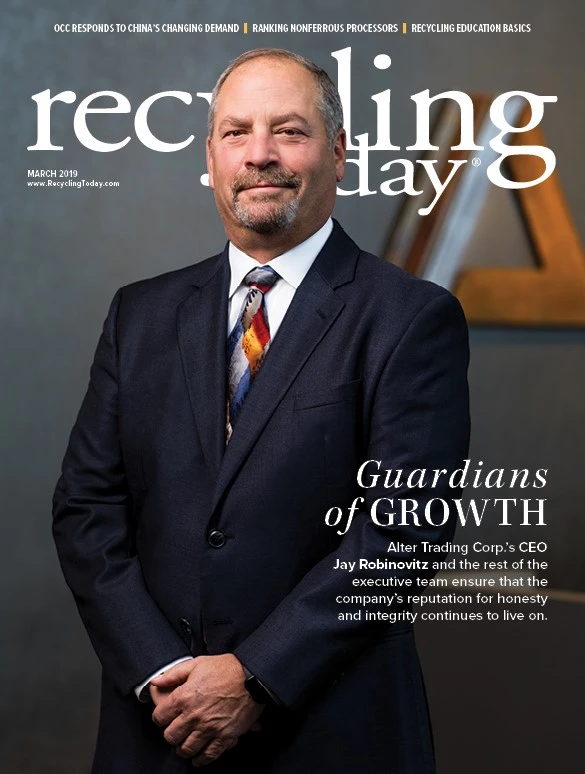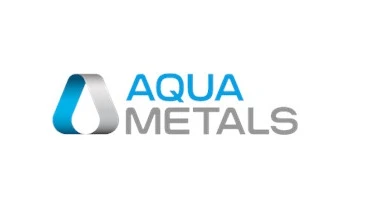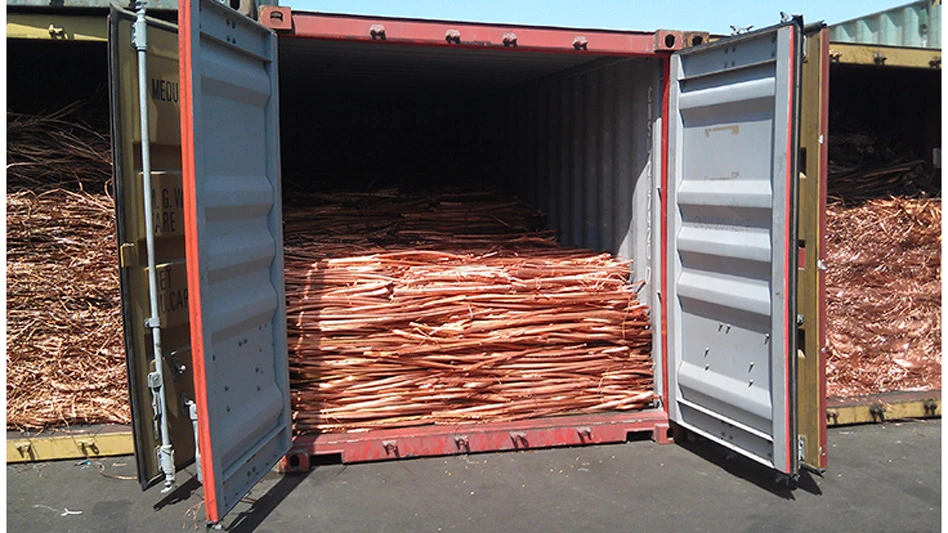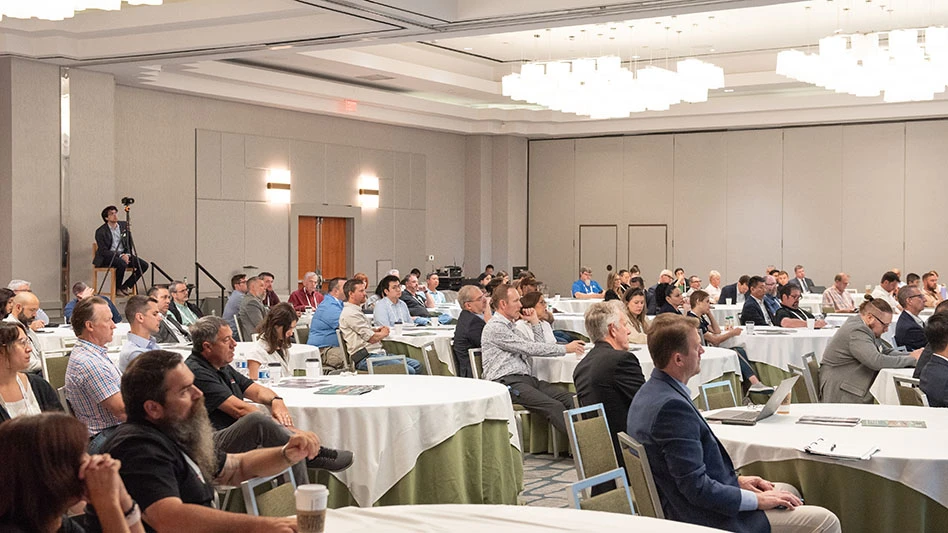
As president of Manitoba Corp., Lancaster, New York, Brian Shine has helped to lead the copper scrap recycling company since 1985. But that’s only one of many leadership roles that Shine holds. He also serves as vice president of finance for Utility Recyclers International, also based in Lancaster. This company, a partnership between Manitoba Corp. and Georgetown, Ontario-based Green-Port Environmental Managers Ltd., collects, transports and recycles obsolete
Shine’s most recently assumed leadership role is that of
“After the merger in 1987, I started going to the ISRI convention and then soon to other meetings and serving on committees,” Shine says. “The Empire Chapter, seeing this, asked me to become a chapter officer. In 1998, I began serving successive two-year terms as secretary, treasurer, vice president
His active involvement in ISRI led the Leadership Committee to invite him to run for the secretary/treasurer position in 2012. “I knew such an opportunity to serve would bring new challenges that would help me grow in my career,” Shine says. “Fortunately, I won my election and since then served on each of the positions in the executive committee, culminating in the chair’s role.”
As a member-driven organization, he says “the more voices and collaboration we have” within ISRI, “the stronger we will be
Shine adds, “Getting involved also helps you grow. I have met many wonderful friends through ISRI and fortified business relationships. It has given me
We catch up with Shine as he closes in on the midway point of his chairmanship with the association and updates us on his priorities for the industry.
Recycling Today (RT): What ISRI initiatives have been among your top priorities during your time as a national officer and why?
Brian Shine (BS): The top priority is continuing to enforce safety as a core value in the industry. ISRI has a number of great safety training programs, useful resources
I look to reinforce the One ISRI initiative, which means forging a stronger bond between each of the 21 chapters and ISRI. We want to make sure members are getting the most of their membership at both the chapter and national levels.
"One of the things I love most about our industry is its resiliency and its ability to evolve.” – Brian Shine, ISRI chair and president of Manitoba Corp.
A third initiative that I believe in is encouraging the younger generation of recyclers to get more involved in ISRI. This includes putting more of a focus on ISRI’s Young Executive Program and leadership training efforts. I’m also a big believer in the powerful combination of youth and experience. ISRI recently introduced a Century Club for industry veterans whose age and years in the industry combine to equal at least 100 years. I would like to find more ways, such as through the annual convention, to bring these two groups together. I think it will be a real benefit not only to the individuals involved but to the association and industry in the long run. We’ve already begun this with an event at last year’s convention, but I would like to continue to expand on it. (The Century Club/Young Executives Session will be Tuesday, April 9, from 10 to 11:15 a.m. at ISRI2019.)
Finally, ISRI is known as the Voice of the Recycling Industry. It is a priority of mine to continue to amplify that voice, particularly on the world stage. As we have seen things develop in China, and changing policies in other countries, ISRI has an important role to play in representing the interests of the industry and educating people on its importance. ISRI is already really the best in doing so, and I want to make sure we continue to take full advantage as industry leaders to create business opportunities for everyone.
RT: It’s been a tumultuous time with the import restrictions that China has introduced. What has been foremost among ISRI’s efforts to help its members navigate these changes?
BS: As the Voice of the Recycling Industry, ISRI has been the one recycling organization representing the industry both in the U.S. and on the international stage. ISRI was the first one to identify the issue and alert its members and other industry stakeholders. And ever since last summer, it has continually met with members of Congress, the [Trump] administration and the U.S. Embassy to provide resources and information on the impact this issue is having on our industry. ISRI has also traveled to China and met with the government there. We have offered a wide range of resources to the Chinese government, including ISRI specifications and best practices for improving their internal recycling infrastructure. We have been in constant communications on both sides of this issue.
In addition, we have put resources in identifying new market opportunities for ISRI members, both domestically and internationally. This comes in the forms of both the geographic location of market opportunities as well as technology to improve the quality of the recycling stream. ISRI’s involvement in programs such as the U.S. Department of Energy’s REMADE (Reducing EMbodied energy And Decreasing Emissions) initiative is one such example. (The REMADE in America Institute’s first goal is to focus on driving down the cost of technologies needed to reuse, recycle and remanufacture materials and aims to achieve a 50 percent improvement in overall energy efficiency by 2027.)
There is also a strong public relations element to ISRI’s work. This includes an aggressive media relations effort to educate mainstream media on what is happening in China, why it is happening and the impact it is having on our industry. It also involves informing them of what the public, brands, municipalities
And maybe most importantly has been the work of our MRF Council in uniting stakeholders. This culminated in the first-ever MRF Summit that we co-hosted with SWANA (Solid Waste Association of North America) in August [2018]. It brought together recyclers, brands
RT: Given the changes that China has introduced, what is your outlook for the red metals sector in the year ahead?
BS: China continues to reshape the global markets for copper and copper alloy scrap, and that is likely to continue well into 2019. In particular, China’s increased demand for higher quality packages of bare bright and No. 2 copper may contribute to tighter market conditions for those commodities, while lower quality scrap commodities may see more balanced market conditions. But with so many uncertainties heading into 2019, including the ongoing trade wars, rising interest rates and increased volatility in commodity, foreign exchange
RT: What do you think the U.S. recycling industry will look like in a decade given the changes brought about by China’s present attitude to scrap imports?
BS: One of the things I love most about our industry is its resiliency and its ability to evolve. We have witnessed this already in the U.S. as a result of China’s actions. I think over the course of the next 10 years, you will see a lot of investment in U.S. recycling infrastructure so that there is a lot more material being processed here. I think this will especially be the case in the residential recycling stream. Municipalities are beginning to realize that they will need to invest in infrastructure and revamping their programs to meet new and developing markets.
“… ISRI is known as the Voice of the Recycling Industry. It is a priority of mine to continue to amplify that voice, particularly on the world stage.” – Brian Shine, ISRI chair and president of Manitoba Corp.
An increase in communications is also already taking place among brands and the recycling industry, and ISRI is a large part of facilitating the discussion. I think this will increase awareness among manufacturers and brands about the recycling industry’s challenges and capability. Hopefully, this will increase the number of products in the marketplace that can be accepted into the recycling stream.
RT: What are you most looking forward to about ISRI2019 in Los Angeles?
BS: Just like every year, there is so much, and it is hard to name just one thing. As always, it is great to see old friends in the industry and see the latest technology and trends on the exhibit floor. What stands out most this year, though, is the team really has put together some new things we’ve never done before at an ISRI convention. You will literally have networking opportunities from morning to night, with an early morning exercise program and late-night parties, it really will be nonstop this year. We are also adding a track devoted to workforce development, a sales training course, ISRI member-only programming
RT: How has your company benefited from membership in ISRI throughout the years?
BS: It has naturally grown through the relationships and connections myself and other family members have built through ISRI. Being actively involved in ISRI obviously gives me more visibility, but I am associated with my company and that alone provides more awareness of what Manitoba Corp. does and its operations. So much of this business is done at a personal level too, so the trust I establish with people through my roles in ISRI carries over to the business side as well.
And, again, the information you get from attending ISRI meetings and just being exposed to other leaders in the industry constantly gives you different perspectives. You see more of how other companies operate, common challenges that you can work together to solve and new opportunities you may not become aware of until it is too late. This all helps you run your business and benefits the industry as a whole.

Explore the March 2019 Issue
Check out more from this issue and find your next story to read.
Latest from Recycling Today
- USTR announces phased measures designed to address China’s shipbuilding dominance
- APR, RecyClass release partnership progress report
- Clearpoint Recycling, Enviroo sign PET supply contract
- Invista expanding ISCC Plus certification program
- Redwood partnership targets recycling of medium-format batteries
- Enfinite forms Hazardous & Specialty Waste Management Council
- Combined DRS, EPR legislation introduced in Rhode Island
- Eureka Recycling starts up newly upgraded MRF





